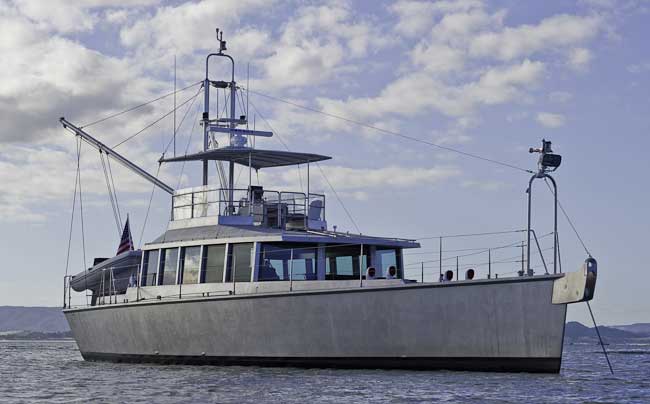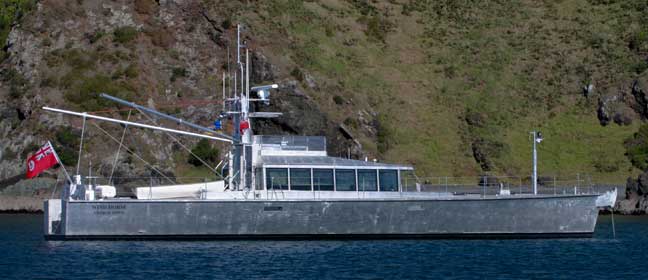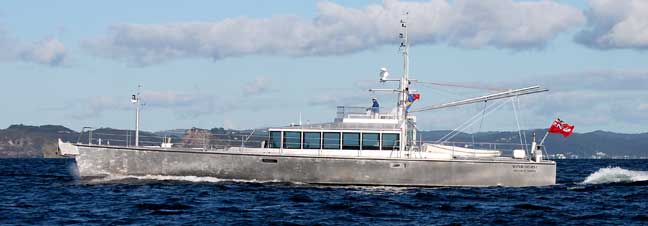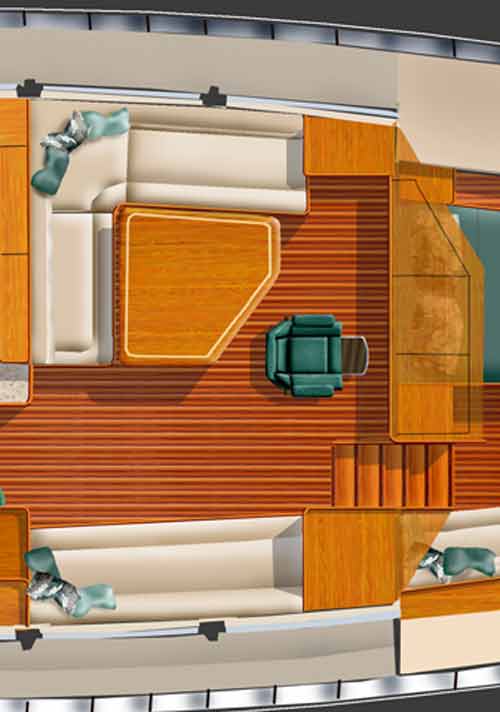The FPB 64 is unique in its ability to assimilate a huge amount of cruising “stuff” yet keep it well organized so that you can find things when needed.
Archive for 2011
FPB 64 Interior Layout

If you have followed the development of the FPB 83, the layout of the FPB 64 will look familiar.
Aft Deck Lounging Area
We have been working on integrating a second lounging area into the aft deck, where you are in the lee of the house at anchor.
Awnings
Awnings are a critical part of comfortable cruising in the tropics as well as in cooler environments.
FPB 64 – Second Series Changes & Options
With the first series of FPB 64s nearing completion we have been hard at work on fine tuning what is arguably close to the ultimate cruising tool.
Designing for Comfort at Sea
“Even the fine details on board make Wind Horse a pinnacle of cruising dedication, like…the 4 in fiddles on every flat surface in the saloon and galley, and the fact that no matter where you are, a handhold or two will be close by.”
–Motor Boat & Yachting
What we’ve found over the years is that even though a small percentage of our time is actually spent at sea, if this time is not comfortable, then the boats tend to sit rather than move on to new locations.
Glazing
“The panes of glass in the steering house are 18 mm thick…”
–Motor Boat & Yachting
It’s not easy to make the structure strong enough for a rollover, or being dropped off a wave – but it’s a cinch compared with getting the window system to stand up to these loads.
Maintaining an Aluminum Hull
“Steve and Linda, prefer natural aluminum because it doesn’t demand the incessant maintenance of a painted boat. In fact, the aluminum oxide that eventually coats the exterior is tougher than any paint.”
–Yachting Magazine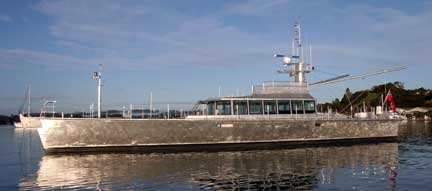
We’ve built about half our clients’ (custom) boats in aluminum, and half in fiberglass. During the material selection process, we’re always asked about the maintenance of both.
Painted or Bare Aluminum?
” Wind Horse is deliberately left unpainted and will take on a dull patina as it self-anodizes. This actually suits Skip and Linda. Apart from removing the need for maintenance, the boat has a low-key ‘workboat’, almost military look about her.”
–Sea Spray Magazine
We have been working through the paint or bare question with clients for twenty-plus years. There are many practical reasons for leaving the topside aluminum bare, but you also need to enjoy looking at the boat.
Hull & Deck Structure
“The key to this design goal was the ability to deal with heavy weather with a margin for operator error.”
–Bluewater Sailing Magazine
Engineering a boat is a mix of science, numbers, black art, and experience. You have to first establish a set of guidelines to use.
Pitching in Headseas
“Our photo boat – a Windy 42 Bora (and a very good sea boat) – is tossed around like a bath toy, but Wind horse just brushes through the crests with laughable ease.”
–Motor Boat & Yachting
Of all the comfort issues facing a passagemaking vessel – power or sail – how it deals with headseas has the biggest impact on crew comfort.
Design Objectives
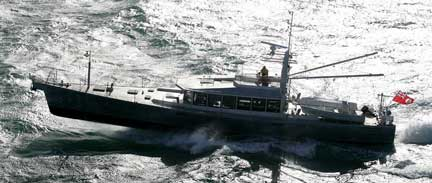
The most important part of the design process is defining just what it is we are trying to achieve.
Canadian Report On The Sinking Of The Sail Train Ship Concordia
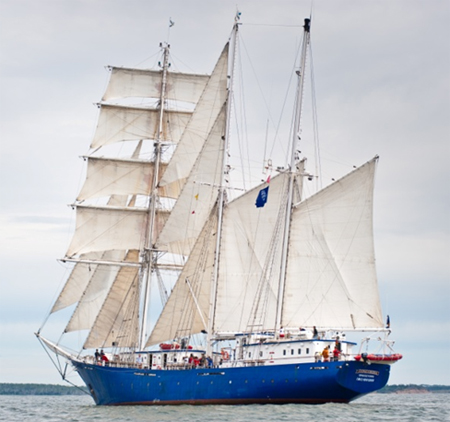
In the spring of 2010 the sail training vessel Concordia was capsized and lost off the coast of Brazil. The crew was rescued and the blame was fixed on an unforeseeable microburst. The Canadian Transport Safety Board has now issued a report covering the incident, which makes for interesting reading.
A couple of points we take away from a quick perusal.
The Importance of Speed
“With no serious penalty in speed, the boat just danced over or through the waves…”
–Bill Parlatore, Passagemaker Magazine
We’ve briefly mentioned the importance of the ability to maintain high average speeds. Let’s take a few minutes now and look at this subject in more detail. We’ll start with weather.
Press Coverage
 Yachting Magazine ,
Yachting Magazine ,
August 2010
“On Top of the World: Wind Horse rides the fjords of Svalbard to 90 degrees North.” Click here.
Deerfoot 61 Ariana In Papua New Guinea
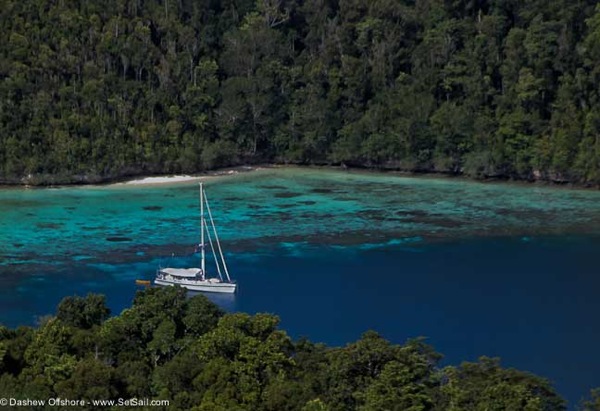
One of the things we love about this business is recieving family photos. This series is of a Deerfoot 61, built in fiberglass at Salthouse Brothers in Auckland, under Kelly Archers’s watchful eye. Of historical interest may be the fact that hull shape is the first to be built from lines drawn with the then amazingly powerful HP 6800 work station running George Hazen’s Fast Yacht.
A Change of Scenery

Cruising is a fulfilling life style. It provides an ever changing mix of people, environment and challenges. When you are new to it there’s a sense of wonder. This comes from a combination of incredulity that it took so long to make the decision to get away, simple pleasure in the achievement, and just being afloat. After a while this new lifestyle becomes the norm; it can even grow a touch stale, and at some point a break is warranted.
Thirty years ago, when we were cruising full time with the kids, we’d move ashore once a year for three to six weeks. This left the boat free for maintenance projects, and gave all of us a chance to delve more deeply into the local milieu. We would come back aboard with a renewed sense of the uniqueness of our lifestyle. In more recent decades, with a home and water base, the change in scenery is, in theory, built in.
But there is a hitch.
Aesthetics – Form Does Follow Function
Last week, while driving with a friend through Colorado, Montana, and Wyoming, we were asked why our yachts look so different from the norm. That got us into a discussion about beauty, function, and environment (we’ll post some photos from that drive in a few days). 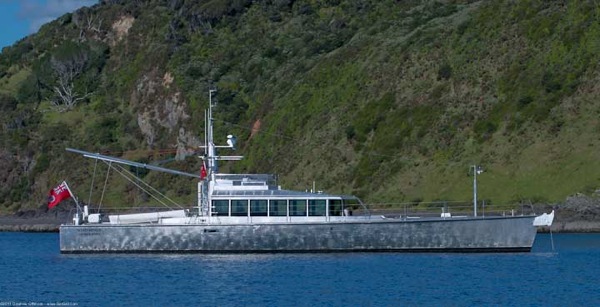 We have always believed that a yacht should make your heart sing, especially when viewed from the dinghy. And while some forms of art – yachts being included in this category – are an acquired taste, there are certain absolutes. Proportions, flow of lines, detailing commensurate with the overall design, are part of this equation. So to is how the object fits into its environment. Art on land is one thing. But when you take it to sea there are other issues. It is here that as Frank Lloyd Wright said “form follows function”. The more frequently one leaves the marina and the further one travels, the more absolute these seagoing considerations. Read the rest »
We have always believed that a yacht should make your heart sing, especially when viewed from the dinghy. And while some forms of art – yachts being included in this category – are an acquired taste, there are certain absolutes. Proportions, flow of lines, detailing commensurate with the overall design, are part of this equation. So to is how the object fits into its environment. Art on land is one thing. But when you take it to sea there are other issues. It is here that as Frank Lloyd Wright said “form follows function”. The more frequently one leaves the marina and the further one travels, the more absolute these seagoing considerations. Read the rest »
FPB 64 Dinghy Launching Procedure
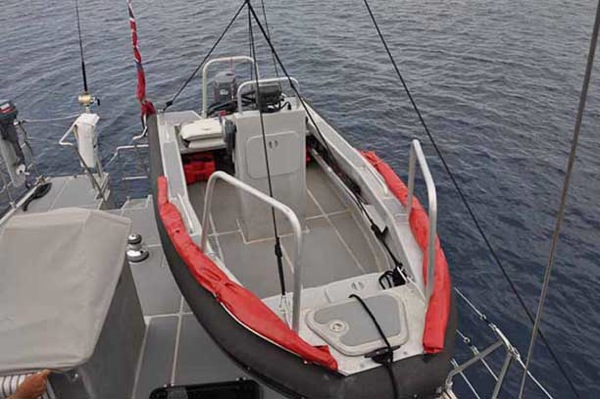
Launching and retrieval of a large dinghy is probably the riskiest endeavor on any yacht. Pete Rossin, of Iron Lady (FPB64-3), has written up the system he uses, the link for which is at the end of this article. Before checking his blog, here are some things for owners of all types of vessels to consider in the dinghy handling process.
FPB64 Construction Update, September 30-2011

We are back from a brief hiatus and are snowed with a desk full of projects. But as your weekend is approaching, and football is so far less than exemplary (at Least in Tucson), we thought a few construction photos might help pass the time. We’ll start with FPB64-6, above, now well along in its metal phase.
How Many Accessory Plug Points DId You Say We Needed?
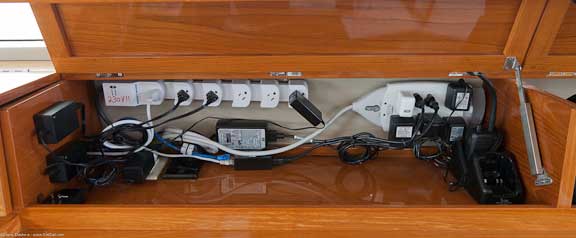
Here is a surprising look at some, but not all, of the items on charge or requiring charging transformers on Wind Horse.
Roll Control Twing Lines
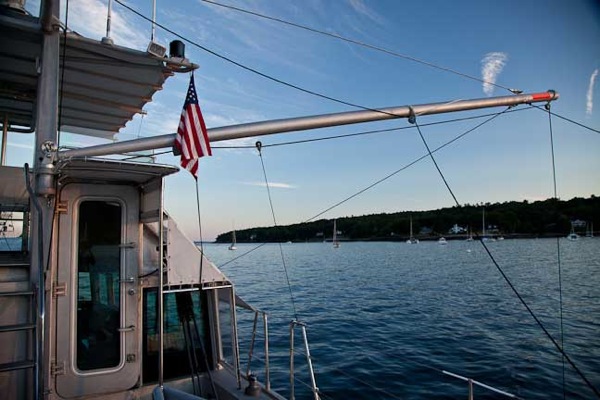
For our at anchor roll control devices we use a halyard which runs from a block at the end of t he boom, inboard to a rope clutch. The problem is that in bouncy anchorages the halyard sometimes slaps the boom, which is annoying.
Favorite Anchorages – Secluded Bay, Baranof Island, Alaska
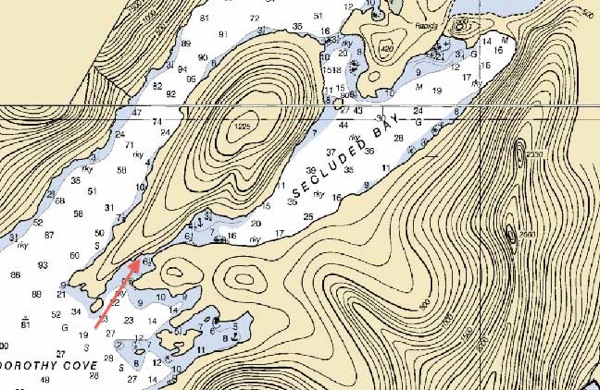 It is Saturday afternoon, football so far is boring, and having been on land now for almost a week we’ve been talking about some of our favorite anchorages. That lead to the thought that it might be nice to share a few of these with you. We’ll start with Secluded Bay, on the West Coast of Baranof Island, in Southeast Alaska. The arrow above points to the very narrow entrance. This was deep enough for the five toot (1.5m) draft on Wind Horse, but so narrow that the tree branches barely cleared our booms. Read the rest »
It is Saturday afternoon, football so far is boring, and having been on land now for almost a week we’ve been talking about some of our favorite anchorages. That lead to the thought that it might be nice to share a few of these with you. We’ll start with Secluded Bay, on the West Coast of Baranof Island, in Southeast Alaska. The arrow above points to the very narrow entrance. This was deep enough for the five toot (1.5m) draft on Wind Horse, but so narrow that the tree branches barely cleared our booms. Read the rest »
Bowthruster Buoyancy Impact
I’m considering adding a small bow thruster to my Freedom 33 cat ketch. In addition to the weight of the unit and tunnel I’m wondering if the water in the tunnel reduces buoyancy by the weight of the water given the volume of the tunnel or if I have to double that as if I was carrying that much seawater in a tank on the boat?
Tropical To Extra Tropical Storm Development – The Most Dangerous Weather Pattern
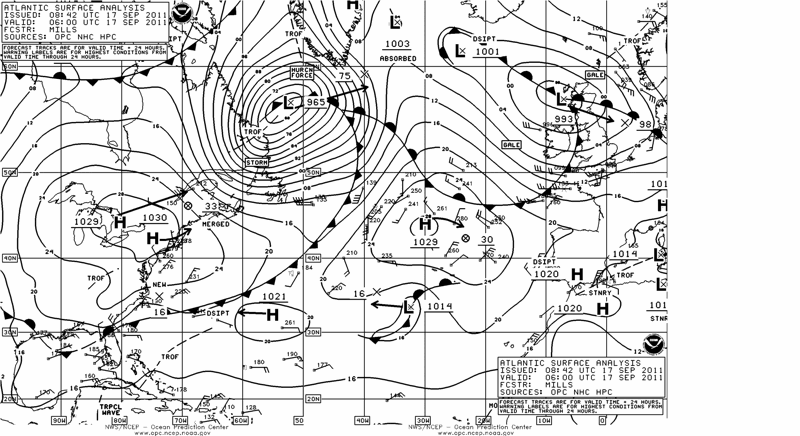
We have mentioned in the past that while hurricanes get the press, their area at sea is limited and they are relatively easy to avoid. If the tropical system morphs into an extra tropical configuration, it covers a huge area, and is nearly impossible to get away from. We have a perfect example of this right now.
Taking A Break On Land
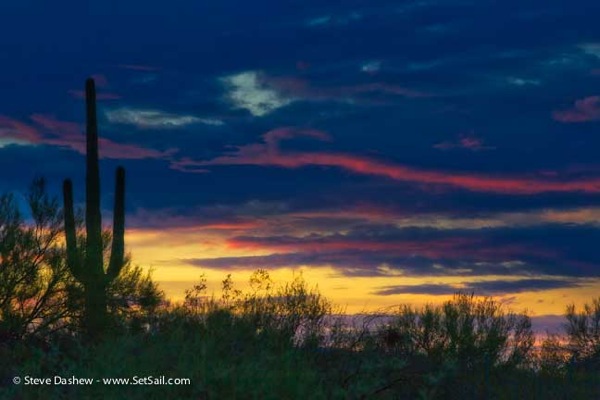
Your humble correspondents are taking a short break from work (which is what cruising while being involved full time in the marine business represents) and heading north toward Yellowstone National Park after a short visit to Arizona. We are looking forward to a week of trees, critters who are either hungry, horney, or just unpleasant in demeanor, and cool weather.
Delaware, Chesapeake, and End Of The Summer Flings
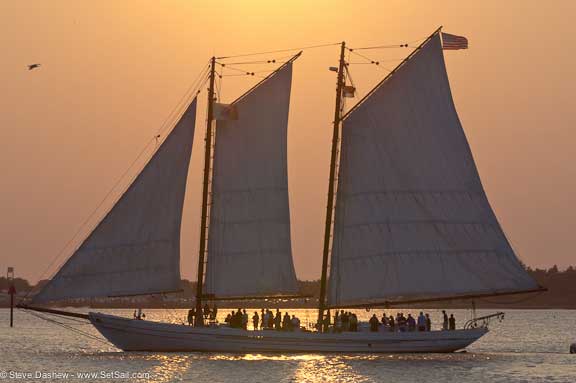
Cape May, Delaware Bay, and the C and D Canal lie in our wake. Time is short, there is a date on land coming up, and we have only been able to get a sniff of these interesting areas.
The locals are out in numbers, taking a last fling at summer freedom.
FPB 64 Vs Reef – Are The Factors Of Safety Sufficient?
“Having a boat that can deal with whatever might happen—no matter what—provides a mental comfort level that defines their view of happy sailing.”
–Bill Parlatore, Passagemaker Magazine
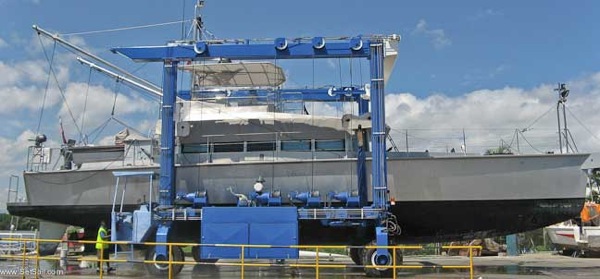
The various rules to which yachts are built are based on seagoing loads. If you design to ABS or Lloyd’s, odds are you will be OK offshore, but there is little extra margin for the mistakes which are a part of cruising. With an ABS keel structure, if you go aground, it is almost certain a trip to the boat yard is in your immediate future. But if you engineer to four times ABS, you are probably going to continue with your cruising.
We have tested these these theories ourselves, and had our owners repeatedly test them on our sailing designs. Now we have some real world verification of the FPB 64’s factors of safety.
The photos which follow were taken of one of the FPB 64s after it tangled with a reef in the Fiji Islands. She has been hauled to replace a damaged stabilizer fin. At the end of this post is a link to the details of the event which has some excellent lessons for us all.
FPB 64 #5 Topped Out – #7 Construction Starts
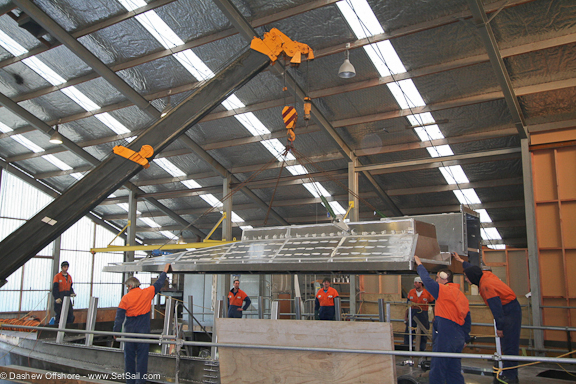
We have been behind in our reports on how the FPB 64 production is progressing. This batch of photos were taken during August and the first week of September. The lead photo is, in construction industry parlance, the “topping out” of FPB 64-5. The jig built roof structure is being lowered over the window mullions. Very precise construction is required for these elements to fit together.
Barnegat Bay, Meeting Old Friends, And Cruising Rhythms
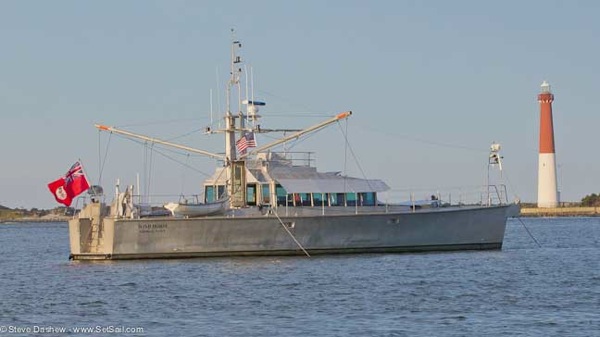
We’ve known for many years that the best way to cruise is without schedule or preconceived ideas about destinations. Staying flexible, being open to opportunity, and making fewer, in depth stops is the most rewarding of cruising rythms. Our visit to Cumberland Island is a good example of how this is supposed to work.
Dismal Swamp
Hi Steve and Linda… we’ve been following you for a few years now, never had a chance to bump into you. We just had on board Peter and Gail from S/V “JABIRU”, good friends of ours since Cuba and we were talking about their experience in the Dismal Swamp. We’ll be going down the ICW with DOMINO (65′ long, 23’wide power catamaran) and the reports we’re getting are conflicting. Some say it’s great to go down the Dismal Swamp, others say that it’s not so good for catamarans: log, debris, etc… Do you have any experience or suggestion to share? Thanks – JP & Marie Dufour, M/Y DOMINO
After Hurricane Irene A Few Thoughts
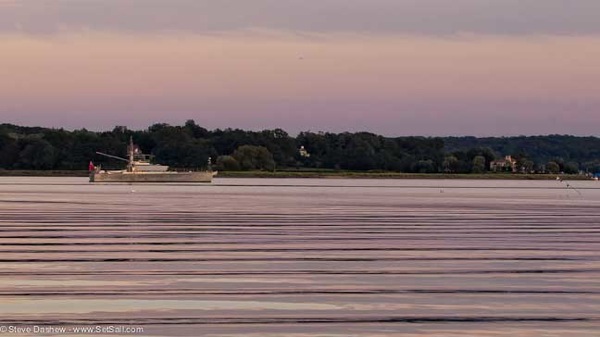
The air is cool and clear, Oyster Bay is once again filled with birds, and the roar of tropical storm Irene is quickly fading from memory. We have a busy couple of weeks ahead with Wind Horse, and then we return to Arizona for a month. Before the lessons learned fade we thought a few observations might be in order.
Irene – After The Eye
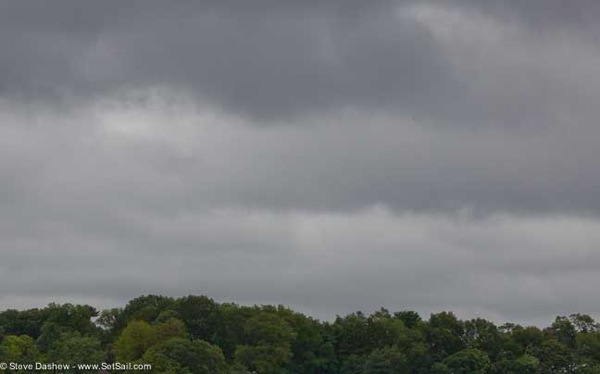
1130, the sun has peaked through the clouds for a few minutes, and the barometer has bottomed out at a relatively high 971mb.
Waiting For The Eye
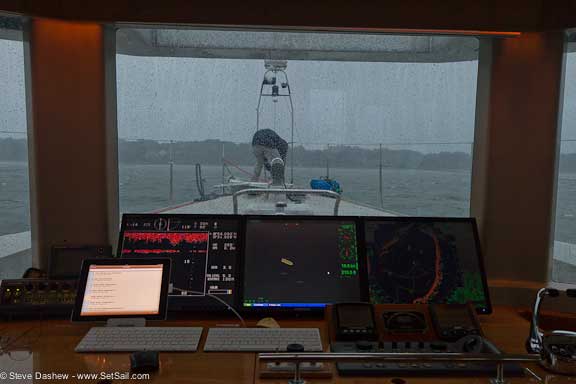
We’ve had a squally night, filled the water tanks, but no major excitement. Michael Jones took this shot of Steve checking and adjusting the snubbers.
Hurricane Irene Anchor Position Logic
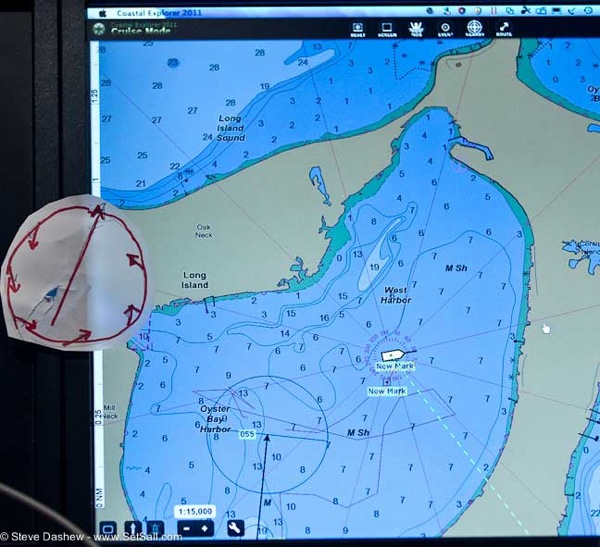
We’ve moved a short distance to the east and reset the anchor. Winds so far are east to northeast, at anything from a few to 25 knots. The drawing upper left represents the circulation of a northern hemisphere depression. As you can see, the wind direction we have indicates the track is to our left or west.
Secured and Waiting For Irene
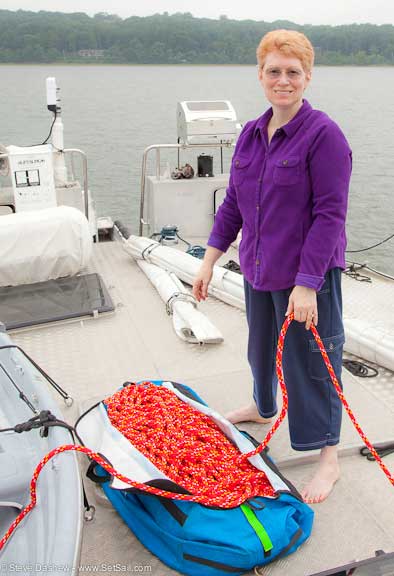
1300 Saturday – Oyster Bay – we have completed hurricane preparations.
June Jones has reflaked the secondary anchor rode, so it is ready to deploy. Notice the figure eight lay to minimize the risk of fouling.
Preparing For Hurricane Irene
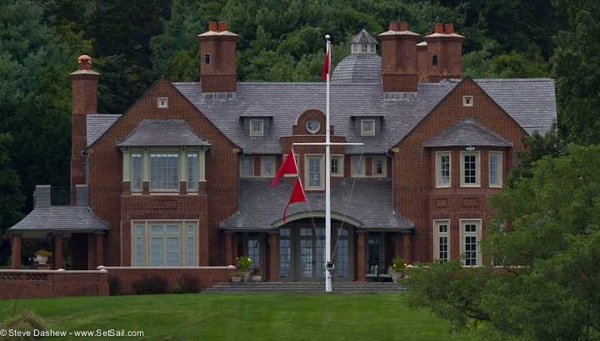
We are anchored in Oyster Bay’s West Harbor, on Long Island (west coast), getting ready for Irene’s arrival Sunday.
Bad Seamanship, Rules Of The Road, and Boat Drivers Who Should Find Something Else To Do

The last few days have seen some shockingly bad, not to mention dangerous, seamanship in crossing or close maneuvering situations. We’ll start with the example above from the narrow channel leading into Nantucket Island’s harbor.
Hurricane Party
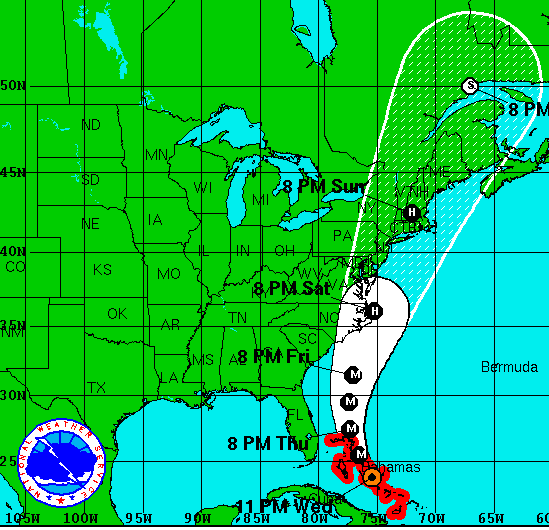
We’ve been working our way back from Maine, with family and friends.
Noland Analog To Digital Converter-21st Century Meets Your Parents Gauges
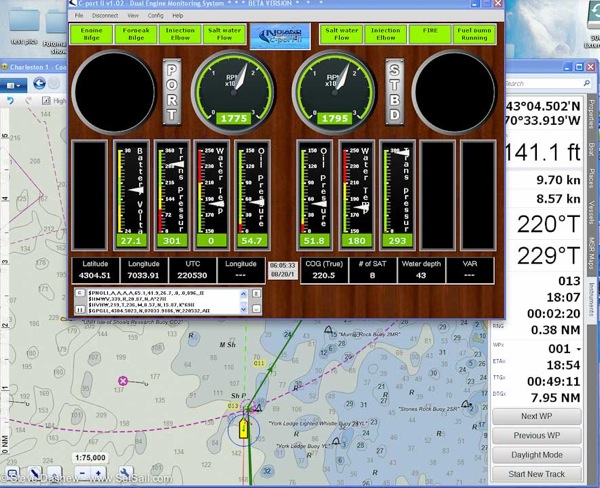
You are looking at something for which we have been waiting since before Wind Horse was launched, an analog to digital converter so we can display our analog engine gauges on the computer. It is shown above sharing the computer screen with Coastal Explorer.
Saloon
The saloon is at the forward end of this raised area, adjacent to the galley and the office. We’ve got 7-foot (2.15m) settees on each side, plus room for two more folding chairs around the table.
Testing Damge Control Pumps
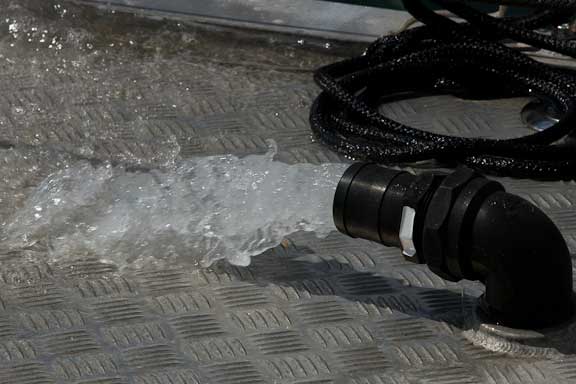
We fit damage control (crash ) pumps to all our yachts. These are plumbed with a single line throughout, and Ts with valves in each watertight section. Although the pumps are self priming, the slightest leak, especially to the forepeak, and they won’t draw. So a periodic test is a good idea.
Sunday Morning And The Sun Is Shining
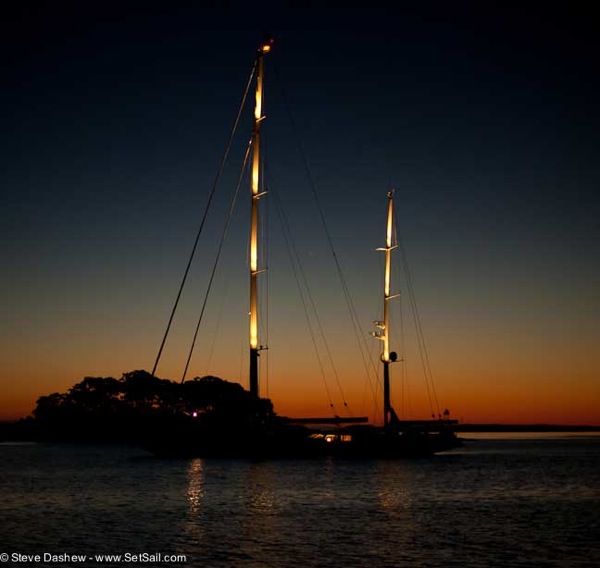
It is a lazy Sunday morning in Maine and having finished our coffees, caught up with a bit of news online, and launched both dinghies for exploration and exercise later on, we thought we’d upload a few photos.
Air Display – Another Useful Ipad App
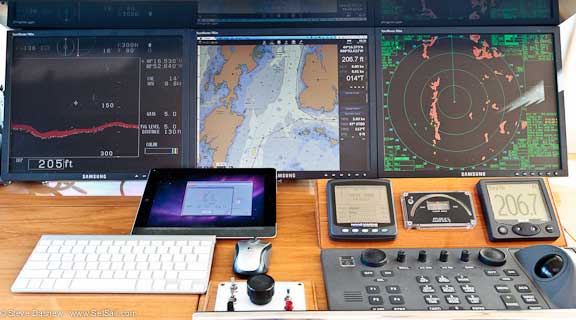
You would think with three computer screens we’d have enough “real estate” for the bridge. But that is never the case, so when Carol Parker mentioned an Ipad App called Air Display, which turns the Ipad into a second monitor for your PC or Mac, we decided to give it a try.
FPB 64 Get Home System – The Solution
Traditional get home systems on single screw powerboats are typically not very functional. They tend to deliver 50 to 60% of the normal cruising speed in calm conditions, and be essentially useless in a stiff breeze fighting a head sea. This has made no sense to us. Why pay the weight, cost, and drag penalties, and make life more difficult maintenance wise in the engine room, if you can only accomplish what can be done with a dinghy acting as a tug? Especially since we have a get home sail.
If we were going to have a diesel powered system we wanted to have a respectable passaging speed, and the ability to make progress to windward in less than ideal conditions.
We now have that system.
A Day At Anchor In Maine
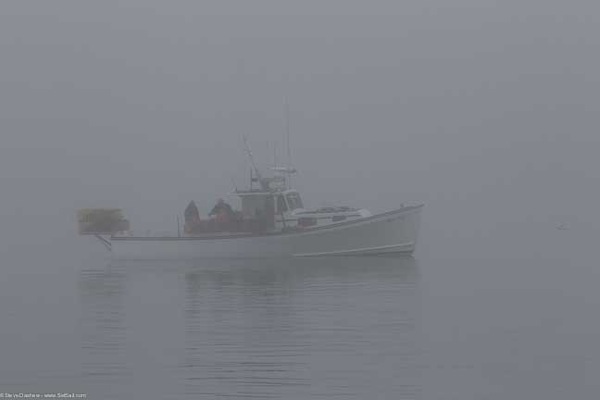
It has been a lovely day anchored near Brooklin, Maine. From cold rain and the first use of the heater this year, to thick fog this morning, to a warm sunny afternoon we’ve seen an amazing array of weather.
Eggomoggin Reach Regatta – History Meets The 21st Century

The plan for the weekend is to attend the Seven Seas Cruising Association gam in Ilseboro, Maine, and then we hear about the Eggomoggin Reach wooden boat regatta. We anguish, up anchor, and turn left rather than right, heading for Brooklin.
UBNT Directional WiFi Antenna

In our never ending quest for Internet connectivity we continue to add tools. This is a UBNT high gain directional antenna. It is mounted on our old FollowMeTV single axis tracker. Keith Smith from Towndock.net in Oriental, NC first introduced us to this unit.
Fat Head Mainsails – Cruising Hardware Answer
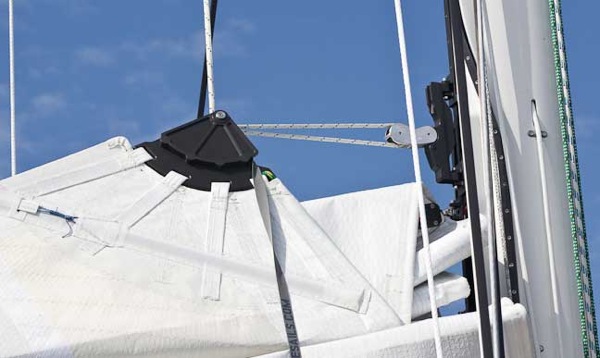
We have been admirers of the efficiency of fat head (squared top) mainsails for years. The problem in a cruising context was the top batten, When hoisting or lowering it tended to jam, often requiring someone aloft to administer assistance. When furling a fat head the headboard needed to be detached from the mast to allow the upper batten to lie down. There may be an answer.
FPB 115 – Final Pilot House Layout
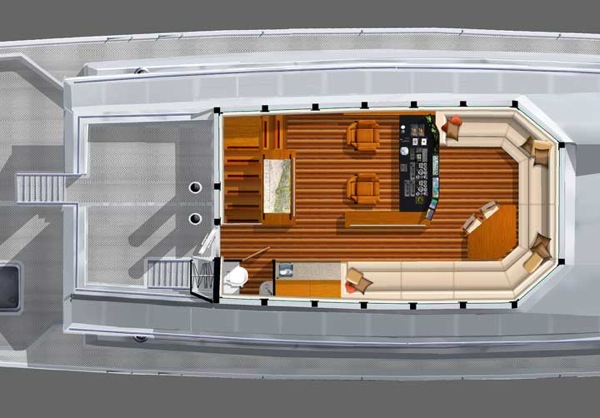
Here is a quick look at the last FPB 115 pilot house layout. We think this one is our favorite for short handed cruising.
Camden, Maine – WIth The In Crowd
Round (Pond) Two
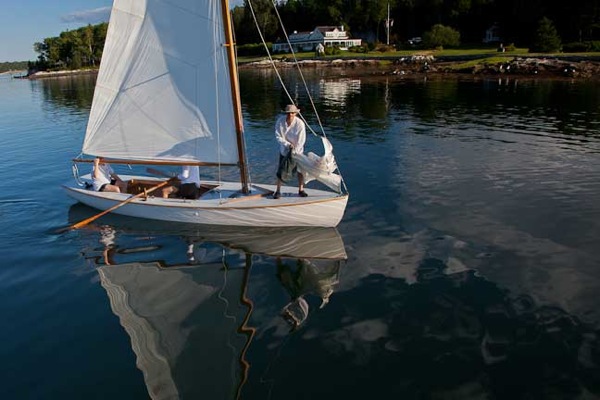
Round Pond has worked it’s magic on us and our stay has extended. Between the sea food, quiet harbor, beautiful surroundings, and friends, if it weren’t for other committments further east, we could sit here for a month.
Splashtop I Pad App Remote Control of Nav Computer – It Works
\

We are about to inform you about a modern miracle. There is an IPad app called Splashtop, which claimed to allow remote control of a computer from the IPad. We were dubious but figured it was worth a try.
FPB 115 Mid Deck Layouts

We’ve got a new batch of drawings for the FPB 115 to share. The commentary will be short (for now), but we will come back in detail next week. At the end of this blog is a link where you can download larger size versions of all the drawings.
FPB 64 # 5 and 6 Update July 22
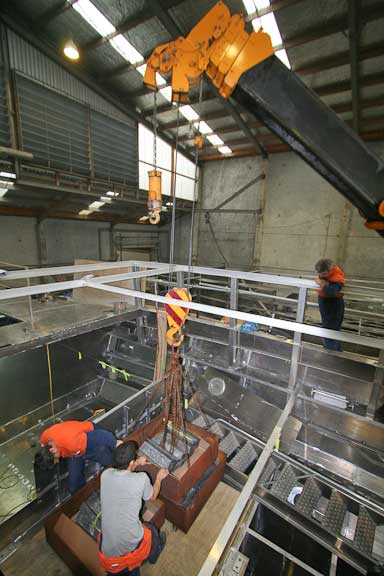
Here is a batch of photos from last week on FPB 64s five and six. We will start with putting lead into the bottom of number five.
Humpbacks Come Calling
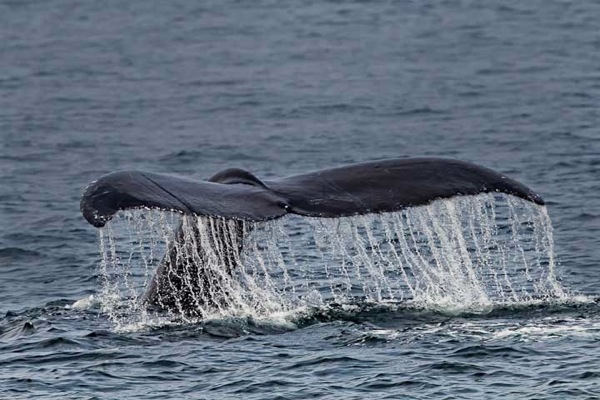
As promised, we have a short but sweet video to share of our recent visit by a pod of humpback whales.
Round Pond, Maine, and the Cruising Paradigm

We are in lobstah territory, which means paying close attention to where we are heading and lots of dodging and weaving.
Catching Up Underway For Maine
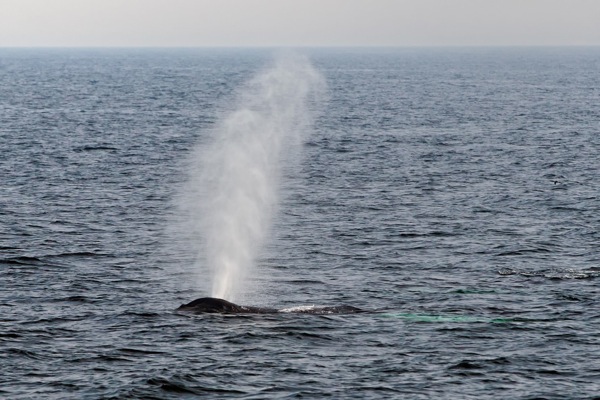
We are still behind schedule, but as we are underway from Providencetown, MA towards Round Pond, Maine, and well offshore, we are working through the last week’s photos before going back to the drawing board.
Fishers Island, New York
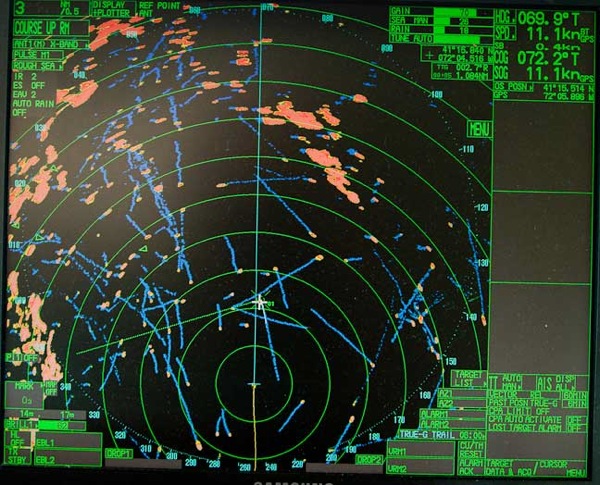
It is Saturday, hot inland, and Long Island Sound beckons those who have the means to enjoy boating. It appears to us as if most of these folks are on our radar screen (shown above on an offset three mile range).
FPB 115 Survey/Science Mid-Deck

We’ve been hard at work wrapping up a myriad of details on the FPB 115. This is a brief look at the mid-deck as it might be designed for survey or scientific study employment.
Inboard Wells For Outboards

Here is a concept for dinghies worth pondering, an inboard well for the outboard. There are many advantages.
Current Events – East River Cruising
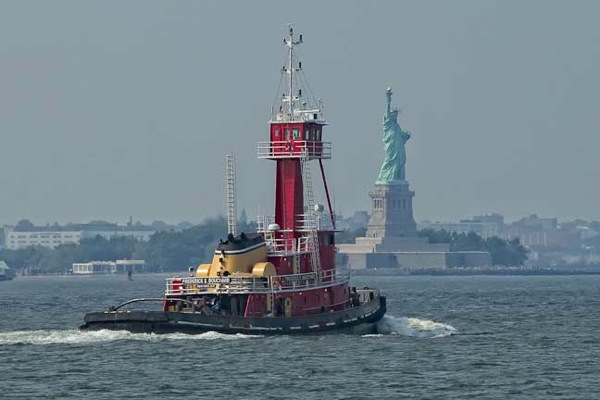
So far this season tidal currents have had minimal impact on our planning. But from the entrance to New York harbor and north this changes. The channel that starts off Sandy Hook, New Jersey can give you three+ knots of help, or hindrance. Picking the best times used to entail laborious calculations. But now we just look at the current atlas data on any of numerous navigation computer programs, check waypoint ETA, and adjust accordingly. Sometimes this works and others it is like hitting all the red lights on your way home.
Norfolk, VA – A Study In Contrast
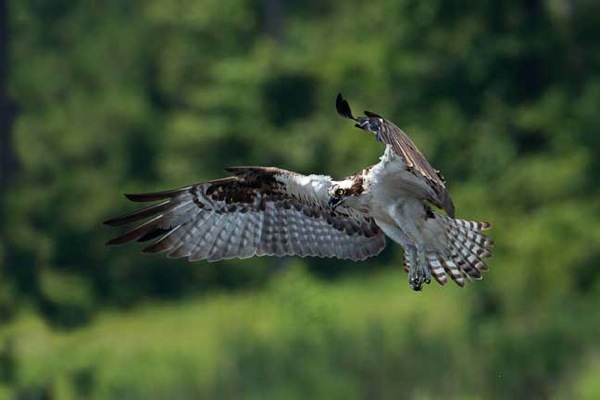
The transition from bucolic Intra Coastal Waterway and Dismal Swamp is startling. You exit the locks at t he head of the Swamp, pass a mile or two of countryside, catch osprey at their work, and then-
Enhancing Visibility Like The Big Guys
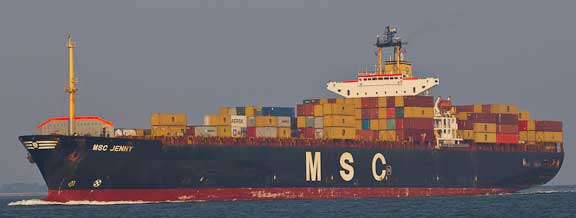
When it comes to being seen by other traffic nothing beats reflective orange. It shows up better than any other color in fog and rain, and is amazing when lit up at night. Many ships are so adorned, and the practice makes sense for yachts too.
Norfolk, VA Poker Run (updated)
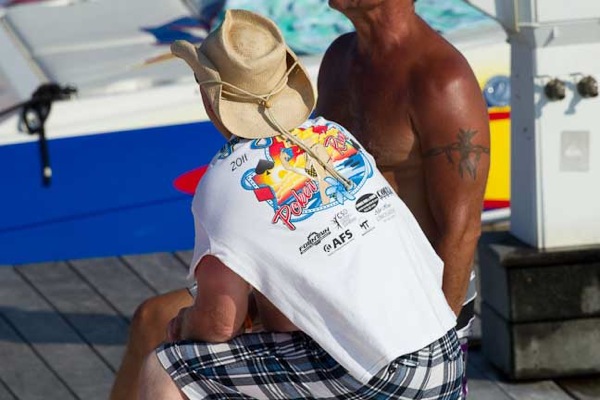
One of the things we love about cruising is the variety of visual stimuli, and different life styles that come our way, in particular those with a marine flavor. In Europe we were in Cascais for an Open 60 regatta, and in Puerto Calero for the RC44 championships. Both were interesting technically, the people watching wonderful, and old world competitors do know how to throw a party.
Now, from Portsmouth, Virginia, we bring you a “Poker Run.” This is an event more in keeping with NASCAR than yachting, and these folks really know how to celebrate!
Before you think we’ve gone daft from too much cohabitation with unsailing, check out the photos which follow, the slide show (although it is R rated), and short v ideo. We promise you won’t be disappointed
The Dismal Swamp – A Fitting End To This Intra Coastal Journey
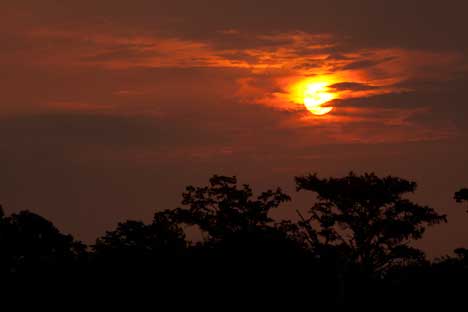
Where to start?
The Dismal Swamp has been a perfect ending to this little cruise along the Intra Coastal Waterway. Lovely beyond the ability of this photographer to capture; quiet, and a variety of wildlife.
FPB 115 Family Style Pilot House
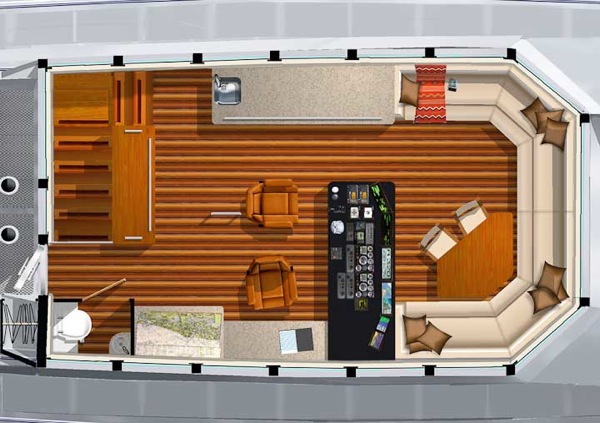
Here is a totally different approach to a pilot house layout, the concept for which was suggested by one of the folks we have worked with to develop the the FPB 115 into what it is today.
FPB 64 #5 and #6 Progress
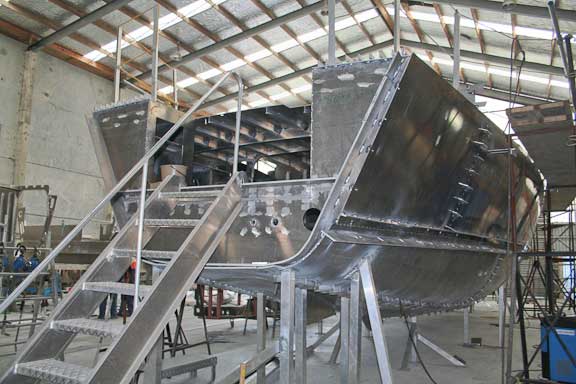
Progress continues in New Zealand on FPB 64s # five and six, with five being fully plated now.
The Ditch Isn’t So Bad
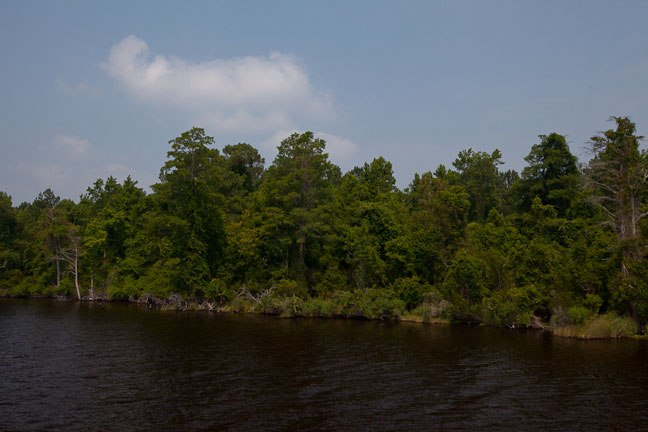
We’re a day from completing the Intra Coastal Waterway. Yesterday’s run was along the Alligator River Canal, essentially a straight line which screams “boring” when viewed on a chart. We found it just the opposite.
Cruising Behind Schedule
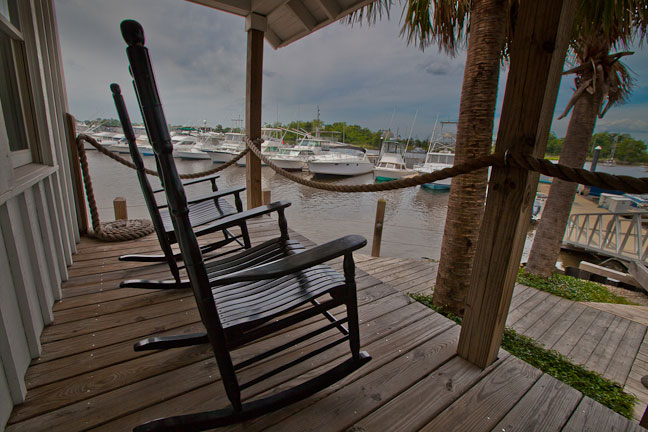
Working while cruising, especially if you are compulsive, can be difficult. Throw in enticing small towns like Georgetown, South Carolina, where the marina office features a veranda with rocking chairs – locals use them – and the schedule quickly goes out the window. We stopped here to have the folks who make our controls, Glendinning Marine, give their system an inspection. There have been a couple of unexplained glitches that we were hoping to get answers to. But while they were not able to make the time to visit us, we did enjoy meeting a former Sundeer 60 owner, and walking this very inviting town.
FPB 115 Cruising Pilot House
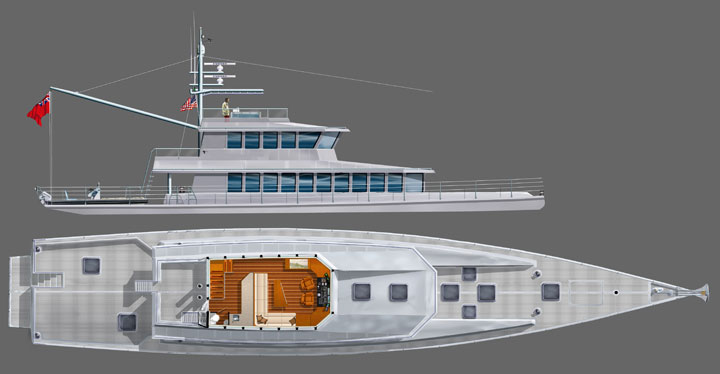
We have been hard at work and a little behind schedule on our web posts, and it is time to catch up. Previously you saw the commercial version of the FPB 115 pilot house. This is what we would term a conventional layout, albeit with quite a large volume.
FPB 115 Basic Specifications
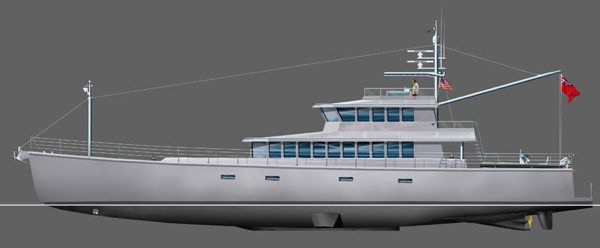
The FPB 115 is the latest in the iconic FPB range of globe trotting motor yachts. Following in the footsteps of the FPB 64 and 83, the 115 offers efficient long distant cruising with the ability to endure adverse weather in comfort and safety. She has a 5000+ nautical mile range at her cruising speed of 12 knots. Given the proven heavy weather performance of the smaller FPBs, the 115 could arguably be called the finest extreme weather yacht ever conceived.
FPB 115 Commercial Pilot House
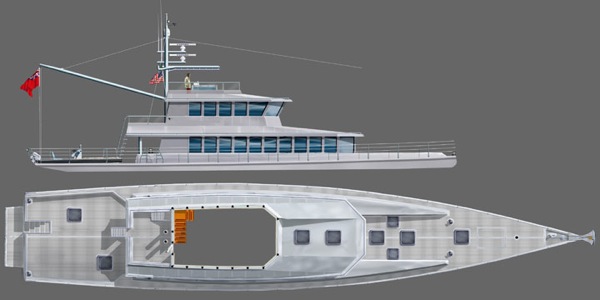
We have had interest in the FPB 115 from many markets, one of which is its use for survey and scientific work. The safety, comfort, and low cost of operation, make it ideal for these applications. So we will start with the pilot house and lower deck layouts for this model.
FPB 115 Commercial Version Sleeping Accomodations

The commercial version accommodations deck was developed around keeping the full time crew, visiting scientists, and survey team, content when off watch. By commercial standards the cabins with heads en-suite are very comfortable.



